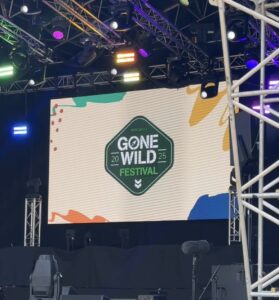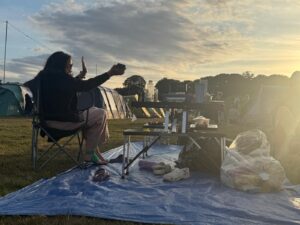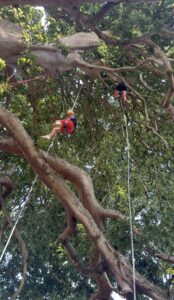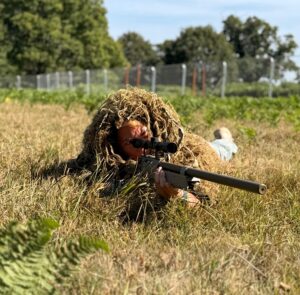This weekend I returned from the Gone Wild festival in Devon, an event founded by Bear Grylls that not only celebrates adventure but also supports remarkable causes. The festival partners with charities to raise awareness and funds — most notably Reorg, which helps veterans and serving personnel through Brazilian jiu-jitsu, and the Royal Marine Charity (RMA), who were a large part of the event. At this year’s festival, a jiu-jitsu training session was held to promote Reorg – we tried to break the world record for the largest class ever held but didn’t quite make it. We got the European record though!

Against that backdrop of purpose, the festival drew thousands of people outdoors, away from screens and routines, and straight into the mud. Think abseiling, throwing axes, plunging into rivers, scaling trees, and leaping off tall towers onto giant air cushions. It was messy, challenging, exhausting — and completely life-affirming.
As I stood among it all, plastered in mud with my family, I couldn’t help but think how deeply Stoic the whole experience was.

Nature as Teacher
The Stoics often spoke of living “according to nature.” For us, that doesn’t just mean respecting the natural world—it means remembering that we are part of it. Yet most of us spend our lives shut off from the earth, boxed inside houses, cars, and offices. Gone Wild was the opposite. We slept on the ground, woke with the dawn, heard geese passing overhead and the rustle of trees in the wind. Time was measured not by the clock on our phones but by the slow arc of the sun.
In that simple act of being outside, we were reminded of the passage of life. As Marcus Aurelius wrote, “Time is like a river made up of the events which happen, and a violent stream: for as soon as a thing has been seen, it is carried away, and another comes in its place.”

To live Stoically is not to conquer nature but to let it teach us: about impermanence, about rhythm, and about how small our problems really are when placed against the horizon of the sky.
The Body in Motion
Stoicism is sometimes thought of as abstract philosophy, but the Stoics valued the body just as much as the mind. Seneca warned against idleness and believed exercise was essential for a disciplined life. At Gone Wild, there was no shortage of physical challenge.

Climbing ropes, plunging into freezing water, wrestling with balance beams—it was a reminder that our bodies are designed to move, to sweat, to strain. The mud, the bruises, the aching muscles the next morning were not discomforts but affirmations: proof that we are alive, that we are capable of more than comfort allows.
In a world where so much is automated and effortless, choosing challenge is itself a form of philosophy. Each time we pushed through fear or fatigue, we were practicing Stoic courage.
Mind Over Fear
Perhaps the most striking moment came when crowds gathered around the tower jumps. Two platforms: one already daunting, the other significantly higher. Most people stuck to the first. Fear froze them at the edge, their own mind whispering reasons to step back.

Then a blind man appeared. Without sight, he climbed to the top of the higher platform, steadied himself, and leapt into the void. Into nothingness.
It was extraordinary to witness. If anyone had cause to retreat, to decide it was too much, it was him. Instead, he embodied what Epictetus meant when he said, “It’s not things themselves that disturb us, but our opinions about them.” His leap showed us all that the barrier is rarely the obstacle itself, but the story we tell ourselves about it.
Community and Connection
What struck me most across the weekend wasn’t just the mud or the challenges, but the atmosphere. Every single person felt part of something. We were strangers, yet not strangers—because the adventure itself was our bond.

The Stoics knew the importance of community. Marcus Aurelius wrote, “What brings no benefit to the hive brings none to the bee.” The festival was proof of this: encouragement shouted at the climbing wall, laughter shared around the campfire, mud-splattered smiles between families. In a time when so many feel disconnected, this sense of shared purpose was priceless.
Returning to the Wild
If the weekend taught me anything, it’s that nature strips life back to its essentials. Sleep, food, movement, connection, courage. These are the things that matter. It is very Stoic to challenge ourselves, to recognise what is within our control, and to release what is not.
We left Gone Wild tired, dirty, and bruised—but also recharged, reminded of what it means to be alive. And maybe that’s the greatest lesson of all: to embrace the wild, not as escape, but as a return.
Time is precious. Don't waste the ride.
If this post resonated with you, you might enjoy The Stoic Rider: Philosophy in Motion.
It’s available now.
👉 Choose your copy here: